What’s Kiyotaki waterfall of Mt.Ontake?
Hello everyone how are you doing? Today’s talk is Kiyotaki waterfall of Mt.Ontake to purify yourself, which sounds like something religious, but please relax and enjoy browsing.
about Mt. Ontake
From Kaida Plateau
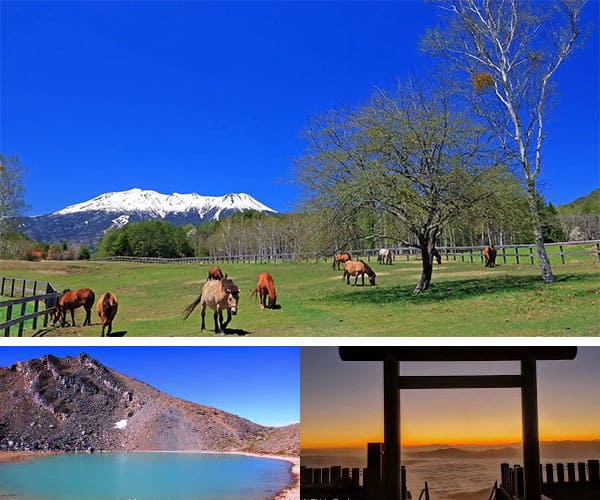 (Left)Ni no ike(pond), (Right)From the top of the mountain through Shrine’s gate
(Left)Ni no ike(pond), (Right)From the top of the mountain through Shrine’s gate
At 3,067 meters, Mt. Ontake, the second highest mountain after Mt. Fuji, erupted at around 11:52 a.m. on September 27, 2014.
It was the worst volcanic disaster since the war, leaving 63 people dead and missing.

Kiyotaki waterfall is said to be that in the Edo period, worshipers were allowed to climb Mt.Ontake after making ablutions in the waterfall that we say “Misogi” (ritual purification).
Mt.Ontake came to be widely regarded as a spiritual mountain and attracted more visitors to the Kiso Valley including to make ablutions in Kiyotake waterfall.
In winter when Mt.Ontake is covered with heavy snow, the fall is frozen.
This waterfall is known as place where Ontake worshipers cleansed their bodies. Even now you can see followers training under the waterfall.
Worshipers have conducted this form of religious training since the Edo period. The practice is called Shojinkessai (purifying oneself religiously).
What’ Misogi, then?
Misogi is a Japanese Shinto practice of ritual purification by washing the entire body. Misogi is related to another Shinto purification ritual called Harae – thus both being collectively referred to as Misogiharae.
Mt. Ontake, the Kii mountain range and Mount Yoshino are but a few examples of ancient and well known areas for Misogi in Japan.
In Kyoto, people douse themselves under Kiyomizu Temple’s Otowa no taki (Sound-of-Wings) waterfall, although the majority of visitors drink from the waters rather than plunging into them.
Every year, many groups take pilgrimages to sacred mountain like Mt.Ontake and waterfalls, lakes and rivers, either alone or in small groups, to perform misogi.
In the United States misogi is performed at the Tsubaki Grand Shrine of America at the Konryu Myojin no Taki waterfall each morning.
Before encountering misogi, members generally undergo some sort of preliminary purification. Such things as prayers, fasting, or some sort of physical activity is common.
Generally, women(left) put on a special white kimono (robe) and a headband,
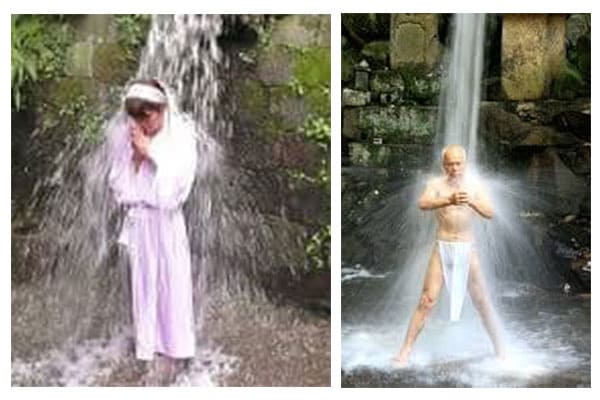 (right)men put on a fundoshi (loin cloth) and head band
(right)men put on a fundoshi (loin cloth) and head band
They then begin furitama (spirit shaking) by clenching their hands in front of the stomach and shaking them up and down, vibrating the upper torso.
The purpose of this is to become aware of/unified with the spirit’s presence within. Following this is a “warm-up” or calisthenics.
These two aforementioned practices are sometimes accompanied by special prayers or incantations.
After, the leader begins to speak out invocations/prayers that are said to activate the spirit.
The followers generally speak along with them, thus affirming the potential for realizing one’s own spirit, and thus unifying them with the kami(deity) around them.
The above exercises are done so participants raise their metabolism and some groups accompany this with deep breathing.
They may be sprinkled with purifying salt and may be given sake to spit into the waterfall in three mouthfuls.
Sometimes the participants are given salt to throw into the waterfall as they enter.
In some groups, the leader counts to nine and then cuts the air while shouting the word “yei!” to dispel this impurity.
The participants then enter the waterfall while continuously chanting the phrase 「harai tamae kiyome tamae rokkon shōjō」.
This phrase asks the kami(deity) to wash away the impurity from the six elements that make up the human being, the five senses and the mind.
The practice of this varies from group to group, each having their own traditions or methods.
Misogi is also used in some forms of martial arts, especially aikido, to prepare the mind for training and to learn how to develop one’s Dantian, or centre.
The founder of aikido, Morihei Ueshiba, regularly used this form of meditation to complement his training and search for perfection.
The Sen Shin tei Misogi Well at Ki Society Headquarters in Japan is a well-known place for people performing misogi with cold water before sunrise.
Last but not least, why don’t you give it a try of Misogi, I pray to bring in you with good fortune!
Thanks for browsing.
Have a nice one!

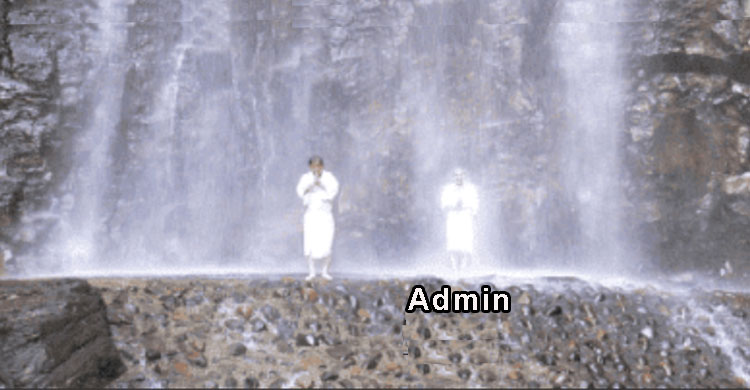

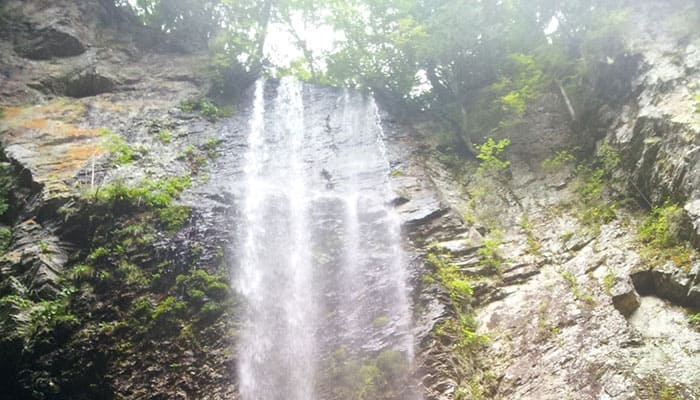
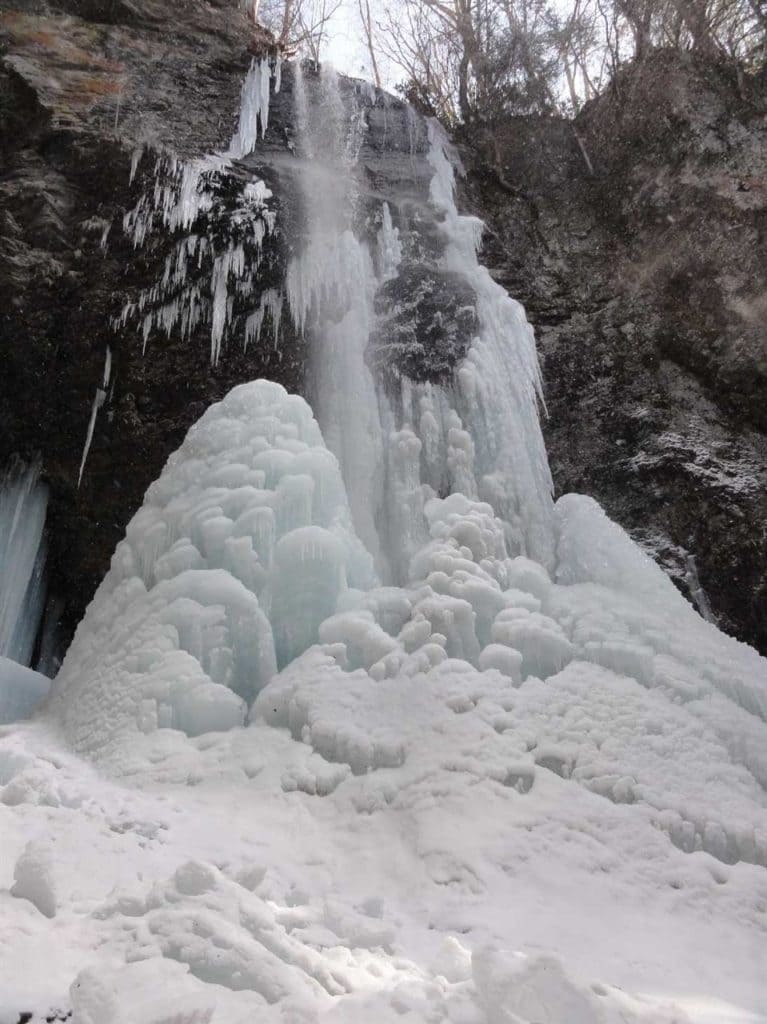

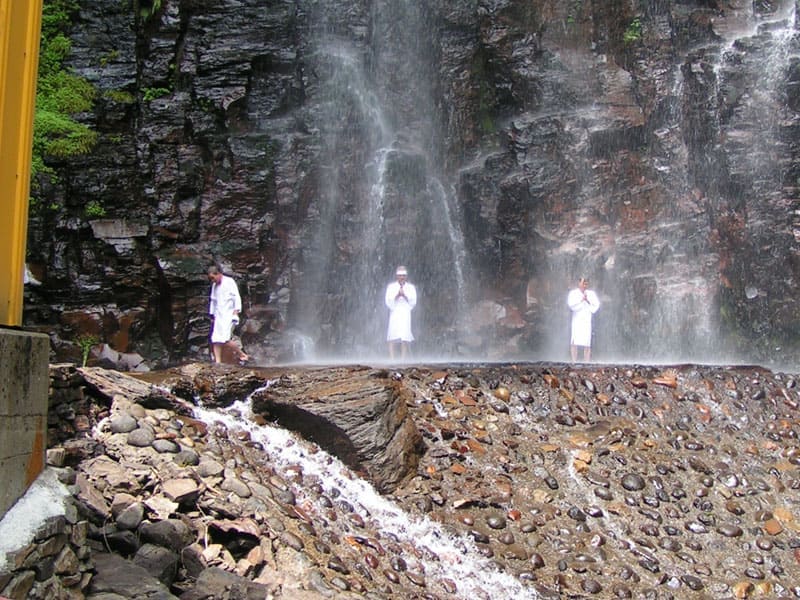
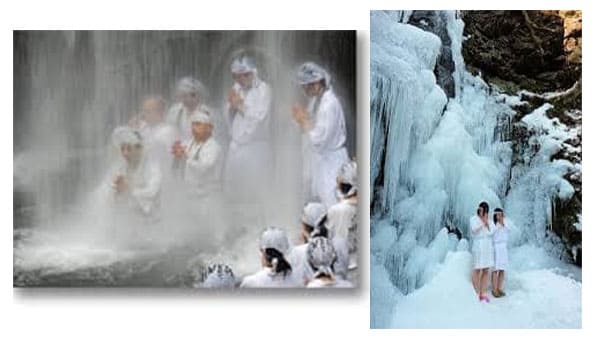

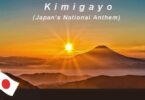




Leave a Comment